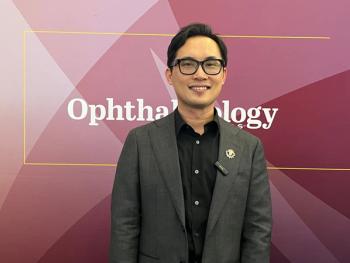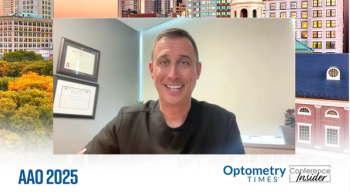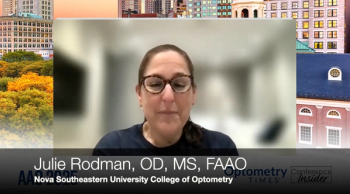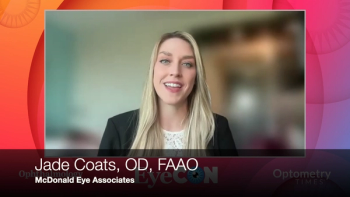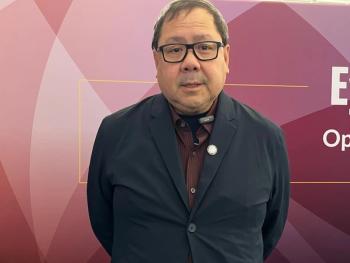
CIME 2024: Inder Paul Singh, MD, and the interventional glaucoma mindset
Inder Paul Singh, MD, defines what it means to have an interventional mindset when it comes to glaucoma procedures and treatments during the Controversies in Modern Eye Care 2024 meeting.
Having an interventional mindset when it comes to glaucoma treatment can save the patient time by finding the procedure or medication that is right for them, according to Inder Paul Singh, MD. He details how to apply this mindset in the chair during an Optometry Times interview from the Controversies in Modern Eye Care 2024 meeting in Seattle, Washington.
Video Transcript
Editor’s note - The following transcript has been lightly edited for clarity.
Inder Paul Singh, MD:
Hey everybody! My name is Paul Singh. I'm an anterior segment and glaucoma surgeon at The Eye Centers of Racine and Kenosha in southeastern Wisconsin and I'm here in LA at the Controversies [in Modern Eye Care] meeting here in 2024. I'm having a good time talking about glaucoma one of my passions as well.
One of the things we talked about here was the idea of an interventional mindset. What does interventional glaucoma mean? It doesn't mean rush to surgery, or rush to do a procedure necessarily. It's more about understanding this idea...this concept that we don't have to always choose one or the other between maintaining a high quality of life or maintaining high compliance and addressing IOP in a safe way. For so many years for us who treated glaucoma mostly, it was hard because we did have to compromise one or the other. Now with all the opportunities that we have with SLT, drug delivery, and MIGs, and even new molecules that allow us to help the mechanism of action of our outflow, decrease the number of drops that we have to use, we can decrease the drop burden and be more aggressive early on [and] maintain a high-quality life as well.
Why that's so important is because you think about it, even from a staff perspective, we found that when we got someone off of one topical PGA, we saved an average of almost 5 minutes per patient/per tech/per visit—all the callbacks, all the confirmations at the follow-up visits. Are you taking your medications? Do you need refills? Are you tolerant of medications?
And then from the surgeon or the provider perspective, when you have to make the decision is someone progressing. Then you have to think to yourself, well, why are they progressing. Are they progressing because the patient was not compliant? Was it because the drops were not absorbed? Because of ocular surface disease? Were the pressures going up and down?
If someone's off that medication and they still are progressing [it's] more of a clear decision tree. You understand what to do next, which I think is so important as well. For me having all these tools we also realize when we treat patients earlier in the disease state, the target pressures tend to be higher. When we wait and wait and wait to be more 'aggressive' getting the pressures down, we have to be more aggressive because the more advanced you get, the lower the target pressure has to be to maintain whatever you have left. If you treat someone earlier in the disease state, you have a better chance of any of these modalities obtaining or getting to that target pressure, that range, be more successful as well.
My advice to anybody out there, it's not about rushing to surgery but always think about this concept of is my patient taking the medications. What's the likelihood of that patient being on this drop regimen long term. We have enough data from the LiGHT Trial [Laser in Glaucoma and Ocular Hypertension], the HORIZON trial, the iStent trials, and many other trials showing us that compliance is now an independent risk factor for progression in our patients and we can maintain a higher quality of life, better contrast sensitivity, if we can reduce the drop burden [and] help the ocular surface as well.
The most important message is if you are someone who's able to do SLT in your area, I would recommend primary SLT for a lot of patients who are in your offices.
If you're not someone who's doing SLT or not able to do SLT in your state, I think it's important to think about referring them to someone in your area that does SLT because the comanagement works really well. Once you do the SLT it comes back to your office. As an OD, it's so much easier to take care of a patient who's not on medications, less ocular surface disease, better contact lens tolerance. And again, this idea of having to worry about PAs and confirming if a patient's on medications can be frustrating and time consuming as well. Think about earlier intervention or sending to someone who does those procedures.
Think about drug delivery as well. You don't have to rush to a MIGS surgery or a cataract surgery but doing something like a bimatoprost-sustained release or travoprost intracameral implant. These things can help along with the top of the drops decrease the drop burden, but still maintain a good pressure for long-term control as well.
Newsletter
Want more insights like this? Subscribe to Optometry Times and get clinical pearls and practice tips delivered straight to your inbox.


